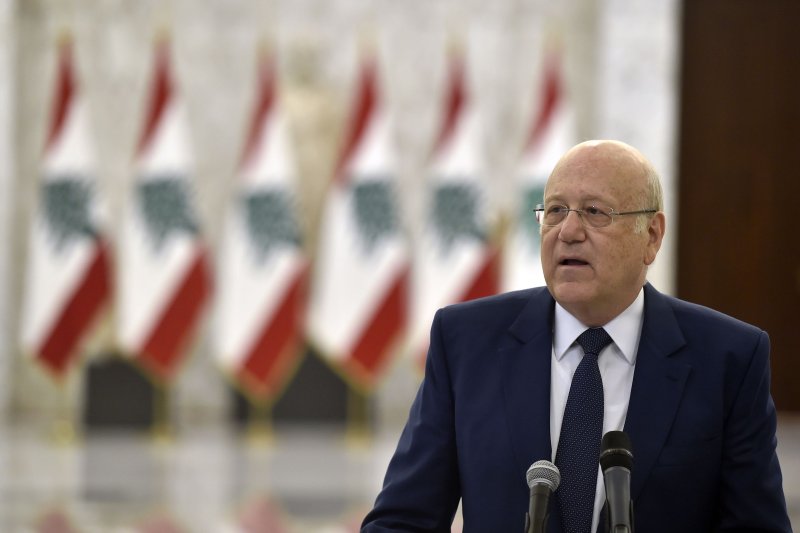1 of 5 | Prime Minister-designate Najib Mikati speaks to the media after his meeting with President Michel Aoun at the presidential palace in Baabda, east of Beirut, Lebanon, on Monday. Photo by Wael Hamzeh/EPA-EFE
BEIRUT, Lebanon, July 26 (UPI) -- Najib Mikati, a Lebanese politician and wealthy businessman, was named prime minister Monday, tasked with the hard mission of forming a new Cabinet to stop the collapse of the ailing country and supervise next year's general elections.
Mikati, 65, a telecoms tycoon and former prime minister, was nominated to the post by 72 deputies from the 118-member parliament during binding consultations held by President Michel Aoun at the presidential palace in Baabda, north of Beirut.
Forty-two lawmakers abstained from naming anyone, while one deputy named Nawaf Salam, Lebanon's former ambassador to the United Nations.
Mikati's nomination came 11 days after Aoun rejected Prime Minister-designate Saad Hariri's last Cabinet line-up of 24 nonpartisan specialists, forcing him to step down.
Hariri, who had tried to form his Cabinet for nine months, blamed Aoun and his son-in-law Gebran Bassil, the head of the Christian Free Patrotic Movement, of constant obstruction for wanting a blocking third to control the government. Hariri also hinted that their closest ally, Hezbollah, did not exert enough pressure to help form his Cabinet.
Mikati, who is set to start non-binding consultations with parliamentarians over the new Cabinet on Tuesday, told reporters after his nomination that he is facing a "difficult mission." But he will work on forming a Cabinet whose "first mission is to implement the French initiative" that should include specialists and enact reforms to unblock foreign aid.
"I don't have a magic stick and can't do miracles... We are in a very difficult situation," he said. "But if I didn't have the required international guarantees and I am convinced that it is time ... to stop the fire, I wouldn't have taken this step."
Mikati previously served as prime minister in 2005 and 2011-14.
While Bassil's parliamentary bloc opted not to name Mikati, as it did with Hariri, Hezbollah, which usually abstains from naming anyone to the prime minister post, voted for Mikati this time.
Mohamad Raad, head of Hezbollah's parliamentary bloc, said the party named Mikati amid "emerging signs that hint to the possibility of forming a new Cabinet" and to reflect "our serious commitment to giving the priority to form a new government."
Kassim Kassir, an expert on Islamic movements and a political analyst close to Hezbollah, said Hezbollah's move was meant to dismiss accusations that the heavily armed Iran-backed group was obstructing the formation of a new government, awaiting the outcome of the Iran-U.S. nuclear talks in Vienna.
"Hezbollah has now an interest to have a new Cabinet, to say its position is not linked to the Iran-U.S. negotiations and to send a positive message to the Lebanese and outside powers," Kassir told UPI. "It is also linked to the economic crisis in the country."
Lebanon's economic and financial crisis has worsened since it started in October 2019, with soaring poverty and unemployment, the Lebanese pound losing up to 90 percent of its value, severe medicine and fuel shortages and main sectors collapsing one after the other.
The U.S. dollar, which last week traded at 23,000 Lebanese pounds compared to 1,500 LL in October 2019, plunged to 18,700 LL Monday morning with the news that Mikati was set to be the next prime minister.
Rosana Bou Monsef, a political analyst and columnist at the leading An Nahar newspaper, explained that Mikati's mission will be limited to starting consultations with the International Monetary Fund that would be followed with negotiations over a rescue plan, stopping the economic deterioration and supervising next year's general elections.
Bou Monsef said that according to Hariri estimates, Lebanon is in immediate need of at least $5 billion as a start.
"France and the other big powers have lowered their demands and now want any government to be formed quickly," she told UPI, referring to their fears of "starvation and the collapse of the Lebanese Army... that would pave the way for extremist elements" to infiltrate the crises-ridden country.
While many doubt that Mikati would be able to overcome Aoun-Bassil obstruction and succeed in his mission of selecting specialists to his Cabinet who would win the approval of donor states, Bou Monsef said, "We could be very well surprised that a new Cabinet could be most likely formed quickly."
She explained that Washington was late in exerting needed pressures, "but there is now a big international pressure."
"Hezbollah also wants to show that it is not obstructing the Cabinet formation for the sake of Iran... At the end, its followers are also feeling the brunt of the crisis, suffering like the others with not enough food and fuel."















